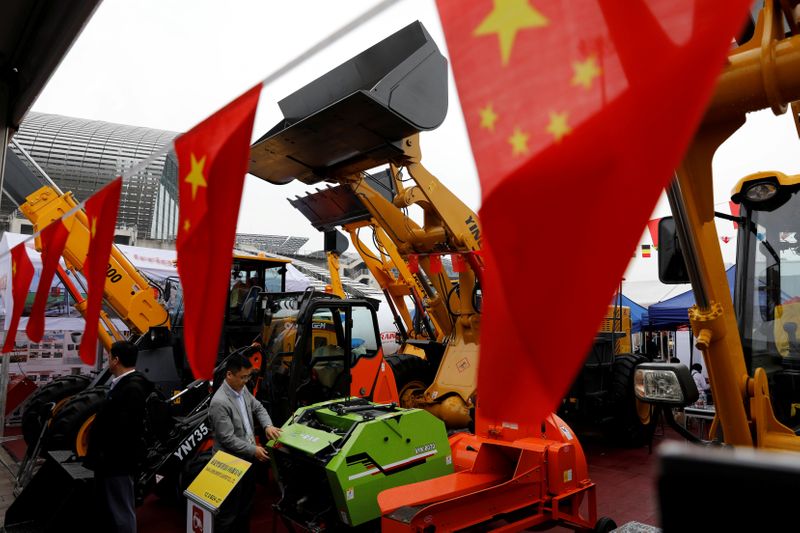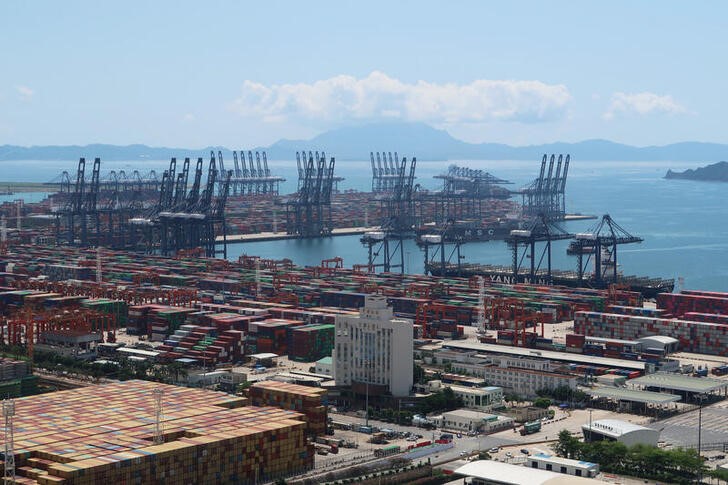By Stella Qiu and Gabriel Crossley
BEIJING (Reuters) - China's imports in June rose for the first time since the coronavirus crisis paralysed the economy, as government stimulus stoked demand for commodities, while exports, fuelled by medical goods, also rose in a sign the recovery is gaining traction.
Beijing has doled out aggressive stimulus to support domestic demand even as a resurgence in coronavirus infections around the world has raised questions about the strength of a rebound in global economic activity.
China's imports in June rose 2.7% from a year earlier, customs data showed on Tuesday, confounding market expectations for a 10% drop. They had fallen 16.7% the previous month.
Exports also rose unexpectedly, up 0.5%, suggesting global demand is starting to pick up again as many countries begin to ease tough anti-virus measures that have pushed the world's economy into its biggest slump in almost 90 years. Analyst had estimated a 1.5% drop following a 3.3% decline in May.
"The significant improvement in China's imports is an indication of the country's accelerating economic recovery, which has been mainly driven by substantial increases in investments in sectors such as real estate and infrastructure," said Boyang Xue, a China analyst at consultancy firm DuckerFrontier.
Indeed, iron ore imports jumped to the highest in 33 months in June, the trade data showed, fuelled by rising shipments from miners and robust demand. Crude oil imports also hit an all-time high amid bargain hunting by Chinese refiners as oil prices collapsed.
Martin Rasmussen, China economist at Capital Economics, expects China's imports will continue to improve as a ramp-up in fiscal stimulus boosts domestic demand.
China's imports from the United States rose 11.3% in June, reversing a double digit declining trend seen after the coronavirus outbreak.
"Faced with difficulties presented by the sudden epidemic, we're still honouring our commitments and implementing the (trade) agreement," customs spokesman Liu Kuiwen told reporters on Tuesday.
U.S. President Donald Trump said on Friday he was not thinking about negotiating a "Phase 2" trade deal with China as relations between Washington and Beijing have been "severely damaged" due to the coronavirus pandemic and other issues.
China's trade surplus with the United States widened to $29.41 billion in June from $27.89 billion in May.
EXPORTS RISE
China's economy is recovering from a sharp 6.8% contraction in the first quarter, but the recovery remains fragile as global demand falters due to social restrictions and still rising coronavirus cases. Chinese consumption is also subdued amid job losses and concerns about a second wave of infections.
The country's export performance however has not been as severely affected by the global slowdown as some analysts had feared, supported by shipments of face masks, personal protective equipment and computers.
"The reopening of major western economies and elevated overseas demand for PPEs and masks supported Chinese exports in June," said Xue from DuckerFrontier. "In addition, production disruptions in China's trade competitors also helped to shift some orders to Chinese exporters."
Despite the partial reopening of Western economies in the past few weeks, some countries are reimposing various lockdown measures to battle a resurgence in coronavirus cases.
"Looking ahead, the boost from shipments of masks, medical products and work-from-home equipment, which are still growing at over 30% y/y, will continue to fade and weigh on exports," said Rasmussen from Capital Economics, adding that exports would start to contract again before long.
Worsening U.S.-China relations, shrinking global demand and disruptions in supply chains are also likely to pressure the trade outlook over the long run, Institute of Advanced Research at Shanghai University of Finance and Economics said in a report on Saturday.

The country's trade surplus for June stood at $46.42 billion, compared with a surplus of $62.93 billion in May.
